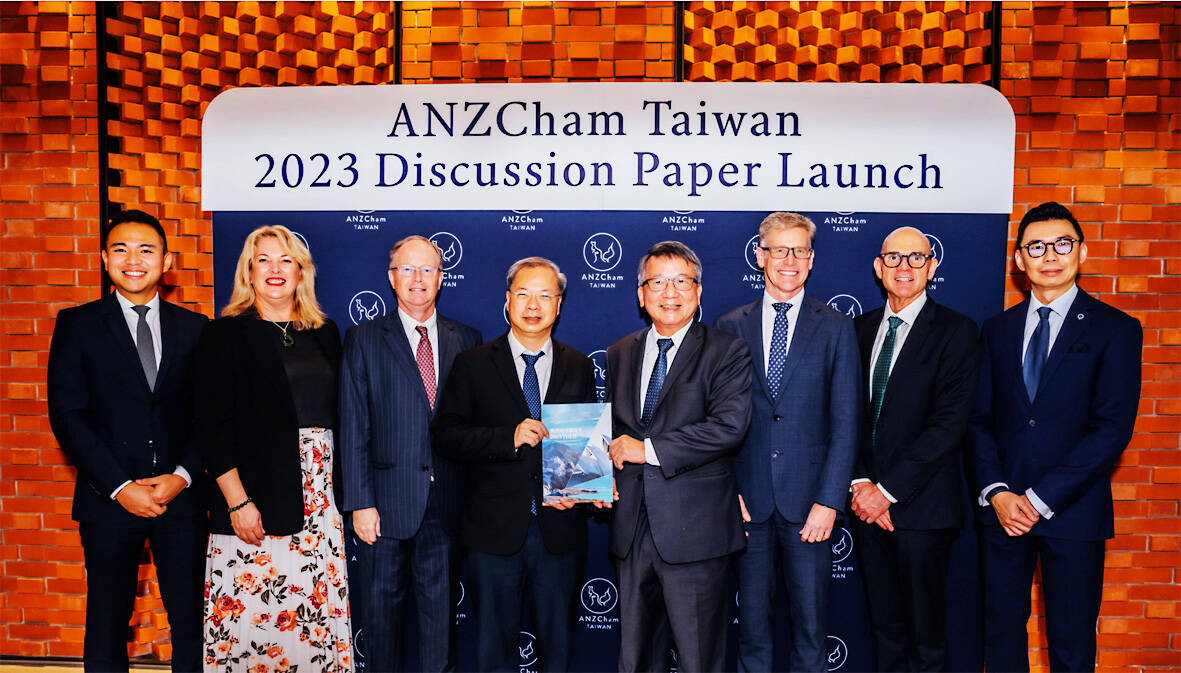The Australia New Zealand Chamber of Commerce (ANZCham) in Taiwan has called for the establishment of a mechanism to cross-reference diplomas and academic certificates issued in the three countries, saying it would facilitate easier exchanges of talent.
Taiwan has yet to establish “a national qualification framework” for cross-referencing diplomas and qualifications obtained in Taiwan, Australia and New Zealand, ANZCham board member Vincent Chang (張維夫) said at the launch of this year’s “Discussion Paper” in Taipei on Thursday.
“For cross-border student exchanges, the imperfect mutual recognition of qualifications will cause various inconveniences when students return to Taiwan for work after graduation,” the paper said.

Photo courtesy of the Australia New Zealand Chamber of Commerce
With that in mind, the chamber urged Taiwan’s government to develop a framework that works similarly to those in Australia and New Zealand.
More than 5,000 Taiwanese studied in Australia last year, making it the second-largest destination for Taiwanese students, Chang said, adding that the establishment of such a mechanism would be “beneficial for the mobility of talent.”
National Development Council Minister Kung Ming-hsin (龔明鑫) said the government would hold talks with relevant parties over the issue.
Kung, who was invited to the report launch, lauded the “highly complementary” economies of Taiwan, Australia and New Zealand, adding that the combined bilateral trade between Taiwan and Australia, and between Taiwan and New Zealand surpassed US$34 billion last year.
Taiwan’s trade with Australia totaled about US$32.2 billion last year, representing an increase of about 63 percent compared with the previous year, the paper stated.
At the same time, Taiwan’s trade with New Zealand reached US$1.9 billion, a year-on-year increase of 14.2 percent, the paper shows.
While trade volume between the three sides has declined this year, that it should be “a short-term phenomenon” and would likely rebound next year, without elaborating, Kung said..
Kung also signaled Taiwan’s determination to “open up” and “work with the international community.”
He added that the country looks forward to expanding collaborations with Australia and New Zealand on the development of alternative energy.
Australian Office in Taipei Representative Robert Fergusson shared similar views, saying Australia has been one of Taiwan’s key energy security partners.
“We’re very keen to ensure we continue to support [the development of alternative energy in Taiwan], and commit to Taiwan’s energy security,” said Fergusson, who assumed the role of the Australian representative to Taiwan late last month.
Meanwhile, Fergusson’s New Zealand counterpart, Mark Pearson, expressed hope that Taiwan and New Zealand could bring bilateral ties to new heights, facilitating more partnerships in the areas of digital economy, innovation and low-carbon technologies.
The discussion paper issued on Thursday also remarked on the lack of clarity on rules and restrictions concerning the import of essential oil products in Taiwan, despite the existence of a standards bureau under the Ministry of Economic Affairs.
The chamber, which represents more than 70 corporate members, urged the Taiwanese government to form an inspection organization to assess the quality and safety of essential oil products and to improve consumer awareness.

Taipei and New Taipei City government officials are aiming to have the first phase of the Wanhua-Jungho-Shulin Mass Rapid Transit (MRT) line completed and opened by 2027, following the arrival of the first train set yesterday. The 22km-long Light Green Line would connect four densely populated districts in Taipei and New Taipei City: Wanhua (萬華), Jhonghe (中和), Tucheng (土城) and Shulin (樹林). The first phase of the project would connect Wanhua and Jhonghe districts, with Chiang Kai-shek Memorial Hall and Chukuang (莒光) being the terminal stations. The two municipalities jointly hosted a ceremony for the first train to be used

MILITARY AID: Taiwan has received a first batch of US long-range tactical missiles ahead of schedule, with a second shipment expected to be delivered by 2026 The US’ early delivery of long-range tactical ballistic missiles to Taiwan last month carries political and strategic significance, a military source said yesterday. According to the Ministry of National Defense’s budget report, the batch of military hardware from the US, including 11 sets of M142 High Mobility Artillery Rocket Systems (HIMARS) and 64 MGM-140 Army Tactical Missile Systems, had been scheduled to be delivered to Taiwan between the end of this year and the beginning of next year. However, the first batch arrived last month, earlier than scheduled, with the second batch —18 sets of HIMARS, 20 MGM-140 missiles and 864 M30

Representative to the US Alexander Yui delivered a letter from the government to US president-elect Donald Trump during a meeting with a former Trump administration official, CNN reported yesterday. Yui on Thursday met with former US national security adviser Robert O’Brien over a private lunch in Salt Lake City, Utah, with US Representative Chris Stewart, the Web site of the US cable news channel reported, citing three sources familiar with the matter. “During that lunch the letter was passed along, and then shared with Trump, two of the sources said,” CNN said. O’Brien declined to comment on the lunch, as did the Taipei

A woman who allegedly attacked a high-school student with a utility knife, injuring his face, on a Taipei metro train late on Friday has been transferred to prosecutors, police said yesterday. The incident occurred near MRT Xinpu Station at about 10:17pm on a Bannan Line train headed toward Dingpu, New Taipei City police said. Before police arrived at the station to arrest the suspect, a woman surnamed Wang (王) who is in her early 40s, she had already been subdued by four male passengers, one of whom was an off-duty Taipei police officer, police said. The student, 17, who sustained a cut about